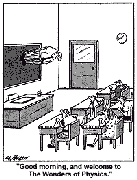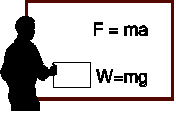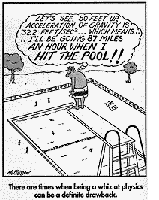PHY 201 Syllabus |
||||||||||||||||||||||||||||
Course Content:Required Text: Fundamentals of Physics, 8th Edition by Halliday,
Resnick and Walker. Why Study Physics?
What is physics? Physics is the most basic science. It touches every part of your daily life at every moment. It governs the heaters and air conditioners, which allow us to live in comfortable surroundings. It is responsible for the light used to read this syllabus, or to make it possible for cars to bring you to class. Without physics energy could not be transported in DNA molecules to allow biological systems to develop, grow and reproduce. The word physics has its roots in the Latin word physica and the Greek word physis, which mean nature. Physics is the study of the underlying principles that govern the behavior of the world around us. It is important that everyone have some understanding of the physical world in our technological society.
particular move is made in the game, merely because it is too complicated and our minds are limited. If you play chess you must know that it is easy to learn all the rules, and yet it is often hard to select the best move or to understand why a player moves as he does. So it is in nature, only much more so; but we may be able to at least to find all the rules. Actually, we do not have all the rules now. (Every once in a while something like castling is going on that we still do not understand.) Aside from not knowing all of the rules, what we really can explain in terms of those rules is very limited, because almost all situations are so enormously complicated that we cannot follow the plays of the game using the rules, much less tell what is going to happen next. We must, therefore, limit ourselves to the more basic question of the rules of the game. If we know the rules, we consider that we understand the world." Study Tips: To many students physics is difficult. Of course, this is true of any subject, which is not understood. The point is that physics can be understood through logic and objectivity. Physics is a subject, which builds on itself. Unfortunately, students must learn the basics, before they can venture to the more interesting applications. So, the subject may at first appear to be boring and not very relevant. Another problem students face is that the study of physics requires new terminology and a new way of thinking. One cannot hope to learn physics the night before the exam. Therefore, in this course you will be expected to do homework assignments on a regular basis. In fact, you should spend several hours a day doing physics. [You should spend at least three to four hours per day on physics outside of class.] A final discouragement to studying physics is the use of mathematics. Mathematics is a tool for expressing the observed relationships between physical quantities. Physics is not mathematics. The principles of physics can be stated without mathematics, but the mathematical equations express the physics compactly and can be used to predict the values of unknown quantities from known ones.
SOLVING PROBLEMS
The goal of physics is to describe the maximum number of phenomena in our universe in terms of the minimum number of general principles. Also, these principles should be as simple as possible. Therefore, as you read the text and follow the lectures, you should get into the habit of identifying these principles. A suggested practice is as follows: STUDYING PHYSICS
Bonus Work:
In order to become familiar with these and other recent developments in physics, there will be periodic bonus questions handed out for extra credit. You will be required to answer these in essay form to receive credit. Only neat work will count! Course Requirements: Attendance: YOU ARE EXPECTED TO ATTEND ALL OF THE LECTURES! After three excused absences, there will be a penalty of 2% for each absence from your total grade. Homework: Homework assignments will be handed out on a regular basis. They will not be collected, but you are strongly encouraged to do assignments before the quizzes are given. Doing the suggested problems on the next page is very important for learning the material in this course. Labs: Satisfactory lab performance is a required part of this course. For each missed lab, your final grade will be dropped by half a letter grade according to departmental policy. There will be an opportunity to made up one lab at the end of the semester. Labs will count 10% of your final grade Instructor permission is needed before touching the equipment or leaving the lab. Exams and Grades: There will be ten 25 minute quizzes and a final given in this course. [That is about one every other day.] Quizzes will consist of a mixture of multiple choice, definitions or conceptual questions plus selected problems similar to those covered in class or in the Suggested Problem list. You will be tested on your grasp of the concepts and ability to use these concepts to solve problems. All quizzes will be closed book and no formulae will be included. Makeup quizzes will be given at a set time to students who have obtained permission. No more than two quizzes can be made up. Graphing calculators may not be used. The final exam will be cumulative, covering twenty chapters, and is to be given 11 am - 2 pm on June 16th. Your grade will be based on the following information:
Plus-minus grading may be used in special cases.
Academic Honor Code: "The University of North Carolina Wilmington is committed to the proposition that the pursuit of truth requires the presence of honesty among all involved. It is therefore the institution's stated policy that no form of dishonesty among its faculty or students will be tolerated. Although all members of the university community are encouraged to report occurrences of dishonesty, each individual is principally responsible for his or her own honesty." Student Handbook. (This includes plagiarism, bribery and cheating.)Student Disabilities: UNCW Disability Services supplies information about disability law, documentation procedures and accommodations that can be found at http://www.uncw.edu/stuaff/disability/. To obtain accommodations the student should first contact Disability Services and present their documentation to the coordinator for review and verification. Suggested Homework Assignments:Doing and thinking about physics is important in learning the material. You should at least do the following problems in preparation for the quizzes and exams. Additional problems will be posted at the web site.
*The rest of the homework will be assigned at a later date and posted at the course
website. Topics To Be Covered:Basics Units, problem solving, trigonometry and vectors.
|
||||||||||||||||||||||||||||
| E-Mail: Dr. Russell Herman | Last Updated: May 05, 2009 | |||||||||||||||||||||||||||






